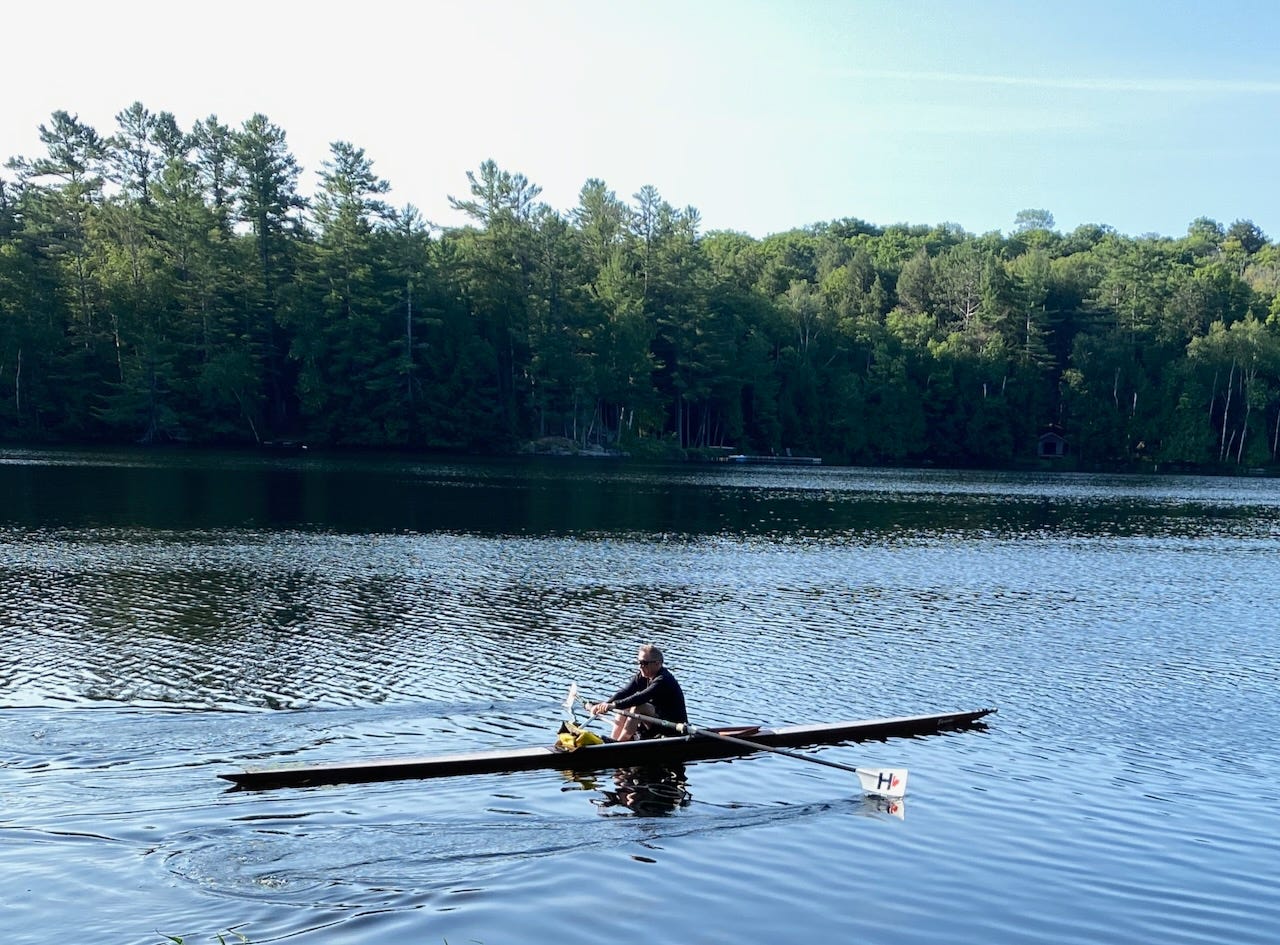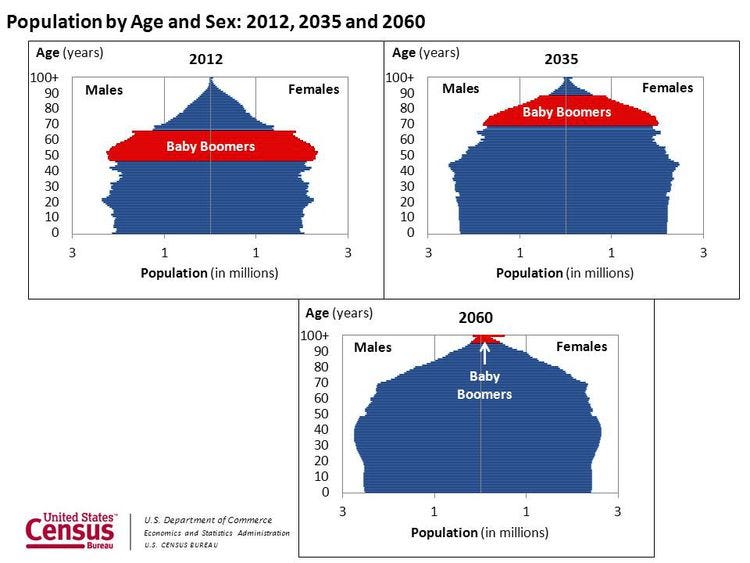The coming crises caused by aging baby boomers like me
Count'em; there's housing, transportaton, health care, urban design, and even climate.
I am feeling old these days. Last Saturday morning I was sitting at my computer when I felt a sharp pain on my left side. I was pretty sure it was a muscle pain; I had a bit of back pain earlier in the week and skipped my morning rows. But this felt different and worse. As Kelly drove us towards Toronto for a friend’s birthday party I doomscrolled heart attack symptoms and started feeling them; is that tightness? nausea? By the time we got to Bracebridge, half an hour south of our cabin, I was certain I was having a heart attack and when I saw the big H sign, asked Kelly to take me to the hospital.
They took me right in and did blood tests, EKGs, Xrays, the works, and three hours later the doctor came in to tell me my heart was fine, it was muscular. I asked him if it was safe to get back in my boat and he said, “You row? So do I. Now I know what muscle it is.”
This morning I got back in my boat and rowed my usual two laps of the lake more slowly than usual, thinking the whole time that I am certainly not alone in feeling old; I am part of that huge baby boomer demographic and we are all getting old together. I am not sure how much longer I will be able to lift the boat out of the water; changes are coming, whether I like it or not.
It’s a subject I wrote about for years on the Mother Nature Network; five years ago I thought it might make a good book and wrote this pitch, which was declined by two publishers as too depressing. Where I note that we have ten years to fix things, it is now five. Please let me know in comments if you think there is a book in this.
The Coming Boomer crisis: A 2030 Fantasy
Imagine it’s 2030. There about 70 million baby boomers in the USA, 20 percent of the population, the youngest of which have just turned 65. Most of them live in single family houses in the suburbs, where the local governments (which they voted in) struggle to deliver more services in spite of diminishing revenues. Half of the people in the country who are still working, and half of the taxes they pay, are devoted to keeping those boomers in their houses.
Life in the big cities isn’t much better; In San Francisco, Seattle, or Toronto, where boomers wouldn’t allow any adaptation to a changing society, they are trapped in their deteriorating houses, unable to get their roofs fixed or their lawns mowed because nobody who does these things can afford to live within a two hour drive and there are no decent trains or transit. They could have moved into one of the many seniors projects built just for them, but most are bankrupt and empty; they cost too much and were in the wrong places, and nobody wanted to leave their homes, which now they can’t sell.
The only companies still growing are Uber, which delivers everybody’s special dietary dinners by bike, and moves everyone around in their custom vans where the drivers can sleep in the back, carrying boomers in the front when they head out to public meetings to oppose rental housing, light rail projects or bike lanes that they don’t use. And Netflix, which keeps everyone occupied most of their waking hours; its easier than going out and meeting people. And Apple, which is on your wrist and in your ears and every other orifice, monitoring everything. And of course, Amazon, delivering everything else.
In Toronto, Canada, the Hard Rock Cafe turned into a Shoppers Drugmart. The Brunswick Tavern, beloved by students for almost a century, became a Rexall drug store. This is the trend everywhere; there is more money in Depends than in beer. The movie theatres are closed, along with most of the restaurants; they are too noisy and there aren’t enough washrooms and with Amazon and Netflix and Uber Eats, who needs to ever go out. It’s too hot anyway, and their houses are air conditioned.
This is all proving financially ruinous for governments at all levels, which is crazy because the boomers could have paid for this; they control 78 trillion dollars in assets, half of all the money in the country. They are still richest generation that ever lived, but they are not parting with it. Since they hate paying taxes and still control the government, the plan is for the government to borrow more money and let the next generation worry about it.
[Warning: when I wrote about this on MNN some found it offensive.]
The next generations are incredibly resentful and are trying to wrest control of the economy and the politics, but it has all been so carefully gerrymandered so that their votes barely matter. As in Japan a decade earlier, the boomers have become American Rougai, defined then as "the harm inflicted on Japan by its elderly." They were described in the Financial Times:
Rougai, in the various mouths of its users, can be the stubborn idiocy of a senior executive who cannot use a computer but decries younger staff as inferior to previous generations. It is shoplifting sprees by retirees. It is superannuated politicians. It is elderly women hectoring young mothers in the street with unsolicited child-rearing advice. It is a snaking queue of septuagenarians dithering over touchscreen ticket machines. It is 90-year-olds causing pile-ups by driving their cars the wrong way up motorways.
Now we have the Baby Boomers, Generation Rougai. 70 million of them. They own the politicians. They own the real estate. They have all the money.
Really?
This sounds like dystopian speculative fiction, but much of it is happening now. This is what happens when you have a huge demographic bulge that has disrupted everything since the 1950s continues to disrupt.
What has to be done, right now, is prepare for the inevitable, the serious ageing of the baby boom generation They are not there yet, and do not really think about the problem much, because they do not actually believe that it is going to happen to them; a recent study shows that almost everyone thinks they are 20 percent younger than they really are. Getting old doesn’t happen until it happens, and these days, for most people who are not in dire poverty, that happens in their late seventies and into the eighties. That doesn’t start for a couple of years and doesn’t really explode for another ten.
So what will really happen?
Baby boomers today are what gerontologists are now calling the “young-old”, and which others call the “new middle age”. 75 percent of baby boomers live in nice houses in nice suburbs, drive private cars to work or play, don't much like paying taxes, and think that they can keep living this way forever.
They can’t. In about 2026, the first baby boomers will hit 80, when they become the “old-old.” They then are joined by 10,000 other boomers every day, until by 2029 the entire baby boomer cohort is over 65 and compose a whopping 20 percent of the population, with well over half being old-old.
The Canadian demographer David Foot wrote that “demographics can explain two-thirds of everything.” That may have been an underestimation. If you look a decade down the road, what you have are pretty close to still 70 million baby boomers, most of whom are going to keep going for another twenty years, going through the “great boomer die-off,” which runs pretty much to 2050. In the meantime we have a series of related crises, any one of which would be serious problem.
The most obvious is the housing crisis, with millions over-housed, thinking that they can “age in place.” But this isn’t a matter of whether they can get in and out of the tub or up the stairs. The real problem is “how do I get out of this place”- the ability to drive is one of the first things to go, and most do not live in walkable communities, they are car dependent. Some will try to sell, downsize and move, but where to? Fully half will have too much money for subsidised housing and not enough for retirement housing. One study from Harvard concluded:
We project that by 2029 there will be 14.4 million middle-income seniors, 60 percent of whom will have mobility limitations and 20 percent of whom will have high health care and functional needs. While many of these seniors will likely need the level of care provided in seniors housing, we project that 54 percent of seniors will not have sufficient financial resources to pay for it.
There is a transportation crisis, where we won’t be able to cope with the number of people who can’t drive. Currently seniors transportation services can cost as much as fifty bucks a ride; Imagine when untold millions are trying to get around.
There will be a health care crisis, because older people account for half of health care spending now, and the proportion will continue to grow.
There will be an urban design crisis, where sidewalks are too narrow to accommodate the numbers of older pedestrians, the mobility devices, the walkers, where every intersection will turn into a death zone.
Coincidentally (although some blame the boomers and would say it’s no coincidence at all) a decade from now is also about the deadline the IPCC says we have to cut our carbon dioxide emissions by 45 percent or we will have a temperature rise of over 1.5 degrees C and possibly run into serious runaway climate crisis. To keep the temperature rise below 1.5, we have to make radical changes in the way we live, the way we get around, and what we consume.
To top it all off, we have a crisis of governance, with baby boomers voting to elect conservative and populist governments who promise to keep things the way they are, who won’t do anything about climate change, who won’t raise the taxes needed to fix what we have, let alone plan for the future. We have baby boomers who fight every bike lane or transit line because it might slow down their driving or remove their parking. Who don’t think about how they will get around when they are old-old and can’t drive anymore. Who don’t think about who will care for them when all the drawbridges are pulled up. This is why some have called them a generation of sociopaths.
This is our crisis scenario, about a decade from now when we have 70 million seriously ageing baby boomers, mostly alone, trapped in their suburban homes that they cannot afford to keep cool or dry because of a rapidly changing climate, possibly in the middle of an intergenerational political war.
It doesn’t have to be this way.
Ten years ago we didn’t have smart phones or electric cars. 50 percent of our electricity was made by burning coal. Except for books, you had to actually go to a store to buy stuff. But things can change fast; Many in the environmental movement look at the buildup to the Second World War, where the entire American economy pivoted to address the crisis and in a decade went from biplanes to nuclear bombs. You can do a lot in ten years.
Also, many of those chronic, lifestyle diseases are a function of where we live and how we get around. One of the reasons Japanese people live so long is the government’s focus on healthy lifestyle; it added a year to an average man’s life just by promoting exercise and counting the number of steps walked each day. People who live in Italian hill towns or New York City have longer life expectancies because they walk so much more. Studies are pointing to exercise as the best predictor of whether people age well.
Alex Steffen once wrote that “what we build dictates how we get around.” Jeff Speck writes in Walkable City Rules that “the first thing one learns in planning school is that how we move determines how we live. If we are going to slow climate change, it will be by reorienting our cities around transit, biking or walking.” That also describes how we slow ageing. However one writes, it, the fact is that our default North American land use and transportation design is killing us, and taking the planet along with us.
It’s all about design
The problems are legion, but there are solutions. There are examples, all over the world, of how people are dealing with it, from new housing types to new technologies.
It’s fundamentally an design problem: How do we build communities and homes where people can get around without driving, can lead enriching and active lives in health and safety, without burning all the furniture and leaving nothing for the generations that follow. We have about ten years to figure it out and make it happen.







I think there's a book here. I think you're addressing important, urgent issues. But your attitude towards Baby Boomers lacks compassion, feels ageist. I'm 71, and I find your characterization of our generation inaccurate or incomplete. There are so few people in my wide networks that fit your description. The people I know have tried to live their values, formed in the anti-war, civil rights, ecologically aware era of the 70s. You yourself seem to fall into that category as well! The plight you describe is indeed one we all share, but it's not our generation's fault that we are in this dire situation and I don't think we are voting as a bloc to prevent change. I love your thoughtful and often humorous posts and I hope you write this book, but perhaps with a slight shift in perspective.
Fascinating!! I always enjoy and learn from Lloyd's articles. Today's is specially good, as it provides clarity on older adults and living healthier and happier. Doable. Combining personal and public sector, creating better cities, neighborhoods.
Boomers have been amazing in may ways, even if not on the environment and housing; the first, more lack ok knowledge.
But look at almost all indicators over the past 70 years around the world: access to clean water, life expectancy, education, reduction of extreme poverty, women's rights, racial equality... etc. Not nearly perfect, but huge advancement.
Next for boomers: a movement to leave a much better world than today's. For everyone. Exciting opportunity.